UNCSW60 evaluation
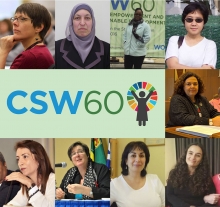
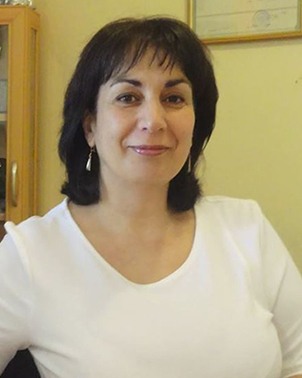
Anahit Asatryan, Republican Branch of Professional Organizations of State Enterprises-PROFROSGU (Armenia)
“Thanks to this event I met with the Head of the Social Affairs Department of the Armenian Government, and presented the problems our trade unions face today regarding the violation of union rights.
My participation was important for our union members. I presented to them the overall event, the importance and impact of PSI organized events. An interview with me, relating to the meeting was published in the media. I was also included in the Network of Men and Women Equality Council of PM office. This is very important for us since we will be able to take part in discussions on different topics on women.”
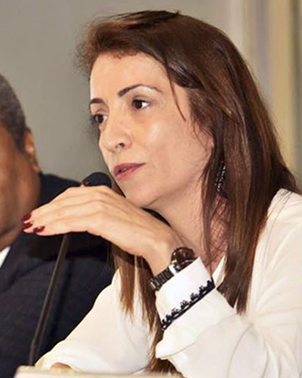
Cíntia Assumpção, Confederação dos Servidores Públicos do Brasil-CSPB (Brazil)
“The dynamics of meetings and workshops was quite intense. Though, many decisions on how to conduct the issues and final guidelines are taken exclusively by government delegations. I reckon that issues concerning the trade union movement and public services in general were little explored - that is a pity since I am convinced that these two areas are key to processes of empowerment and protection of women in their legal and social conditions.
As a suggestion, I find it important that the preparation for the next CSW session includes previous virtual meetings among the delegates, especially those who are regionally closer, for a better understanding of both: the event's dynamics and the agencies that comprise the UN system.”
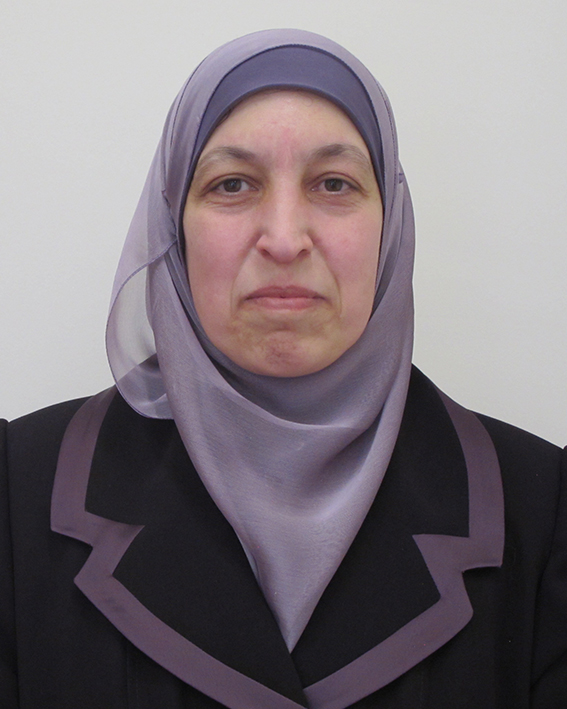
Randa Ali Numan Al-Khaldi, General Trade Union of Workers in Health Services and Pharmaceutical Industries (Jordan)
“How can we think of achieving the MDGs while some countries are engaged in wars that have killed and are still killing innocent people? The international community does not react and only thinks of the MDGs and how to help refugees! Why don’t they think to stop wars and suffering beforehand rather than waiting for there to be refugees and then think about helping them.
In the next year I hope to see more about this subject. But I felt that we, as Arab women trade unionists, failed in the preparation and organization of such an even. We did not have a clear plan or strategy or a paper with dedicated and clear goals for the Arab region in order to mobilize other organizations and get their support. We need to learn more from other delegates on how to work, how to mobilize and how to organize advocacy for our goals and aims.
Maybe next year those who will be attending should be trained on how to do this. I felt we covered several topics, but did not focus in a sufficient manner on Arab women, especially trade unionists.”
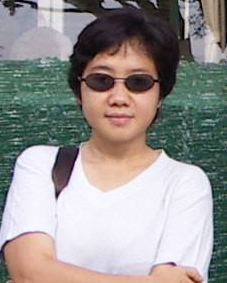
Tuti Suwartini, Pharmaceutical and Health Workers Union (Indonesia)
“PSI’s delegation has made great achievements especially those who became resource persons in every event. The PSI side event also ran very well. Women Leaders from the Arab region are very strong and impressive. I learnt a lot from them and respect them as well as the other delegations working together in the preparation. Last but not least, I thank PSI for giving me such great experience participating in the UNCSW60. For most of those coming for the first time, it made us feel very lucky. Thank you!”
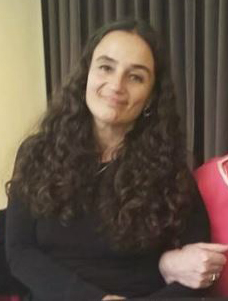
Gabriela Figueroa, Asociación del Personal de la Universidad de Buenos Aires-APUBA (Argentina)
“I agree with everything the trade unions raised in the amendments to the document and we as Argentinian women commit to carrying out and fighting for their development.”
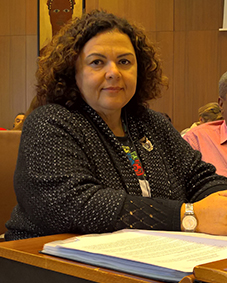
Juneia Batista, Federação dos Trabalhadores da Admin. e do Serviço Púb. Munic. do Estado de São Paulo (Brazil)
“It is important to establish relations with the governments before, during and after the CSW, because the governments are the ones who end up deciding and addressing the final declaration. They need to know our demands even if they do not appear in the end [on the final text].
I still strongly disagree on how we participate in the official meetings. We have little time to expose our views, which leads often to a unilateral decision! This really has to change.
Major important issues as world peace and the lives of women who live in conflict zones must always be part of the annual agenda of the CSW. Also, more and more women perceive themselves as those who are the most exploited due to global trade agreements that privatize public services and make them precarious – these public services in turn are increasingly absent and degraded.”
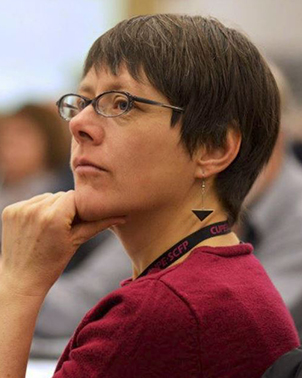
Irene Jansen, Canadian Union of Public Employees-CUPE (Canada)
“Thanks to the work of trade union delegates, all member states got some language changes, though of course we didn’t get everything we wanted. We got reference to the International Labour Organization’s (ILO) Fundamental Principles and Rights at Work, but corporate lobbyists defended “socially responsible private sector” language and UN Women’s “empowerment principles”, both of which camouflage commercialization. Trade union pressure achieved language like “universal and equitable access for all to safe and affordable drinking water, and adequate sanitation and hygiene” as well as “universal access to quality education and health care” but did not get a commitment to public ownership and delivery of those services. We got “employment” added to the list of measures for women with disabilities. “Progressive” was added to the tax reform paragraph, but not “shift the tax burden to corporations and extractive industries”. These are just a few examples of what we sought and what we achieved.”
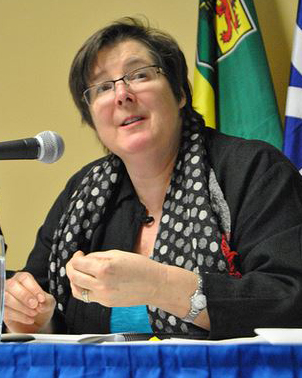
Andrée Côté, Public Service Alliance of Canada-PSAC (Canada)
“Last year the Agreed Conclusions had been negotiated in advance of the CSW meeting, and this had been denounced by women’s groups, global unions and other women’s rights defenders. The trade union delegation last year demanded a more inclusive and participatory process for UNCSW meeting, that would allow trade unions women’s groups and other civil society groups to have meaningful input on the draft Agreed Conclusions.
Thanks to the pressures on UN Women, a resolution on the “Working Methods of the UNCSW” was adopted during the second week of the UNCSW session, and it does seem to have resulted in a better process this year.
A “zero draft”’ of the Agreed Conclusions was issued in early February, and PSAC had opportunity, via the Canadian Labour Congress, to submit our comments to the Canadian officials working on the negotiations. Some of our proposed language was adopted by these officials and incorporated in the very first draft.
As in previous years, while in NYC, PSAC was active in the ad hoc international “drafting group” that proposes specific language to the draft Agreed Conclusions as they evolve. The Agreed Conclusions document was agreed to on March 24.
The international trade union delegation was effective in getting a lot of its priorities in the final Agreed Conclusions document.
There is a specific recognition that women must have equal opportunities to “full and productive employment and decent work” (e) and that governments must:
- promote “women’s rights to work and women’s rights at work”
- ensure “equal pay for equal work or and (sic) work of equal value
- protect women against discrimination and abuse in the workplace
- facilitate access to “universal public services” (par. f)
Women’s groups, trade unions and human rights organizations now need to hold the federal government accountable for the commitments that it just made in this important UN forum.
We also need to prepare for next years’ CSW that will focus on a theme of great importance to trade unions: The Economic Empowerment of Women and the World of Work.”
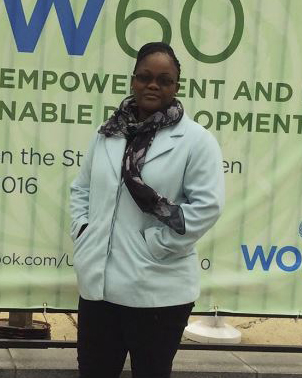
Mathilda Tilly Masame, Botswana Public Employees Union-BOPEU (Botswana)
“The CSW60 is the first CSW we have attended; it was quite exciting, however, we were deterred from exploring the entire CSW. In short, I am limited in terms of evaluating the success of the PSI delegation in the CSW60 as we did not fully engage throughout the CSW, because I was part of the Governmental Delegation. In the future, more coordination among us is needed.”
More information:
- UNCSW60: Commission on the Status of Women (PSI website)

